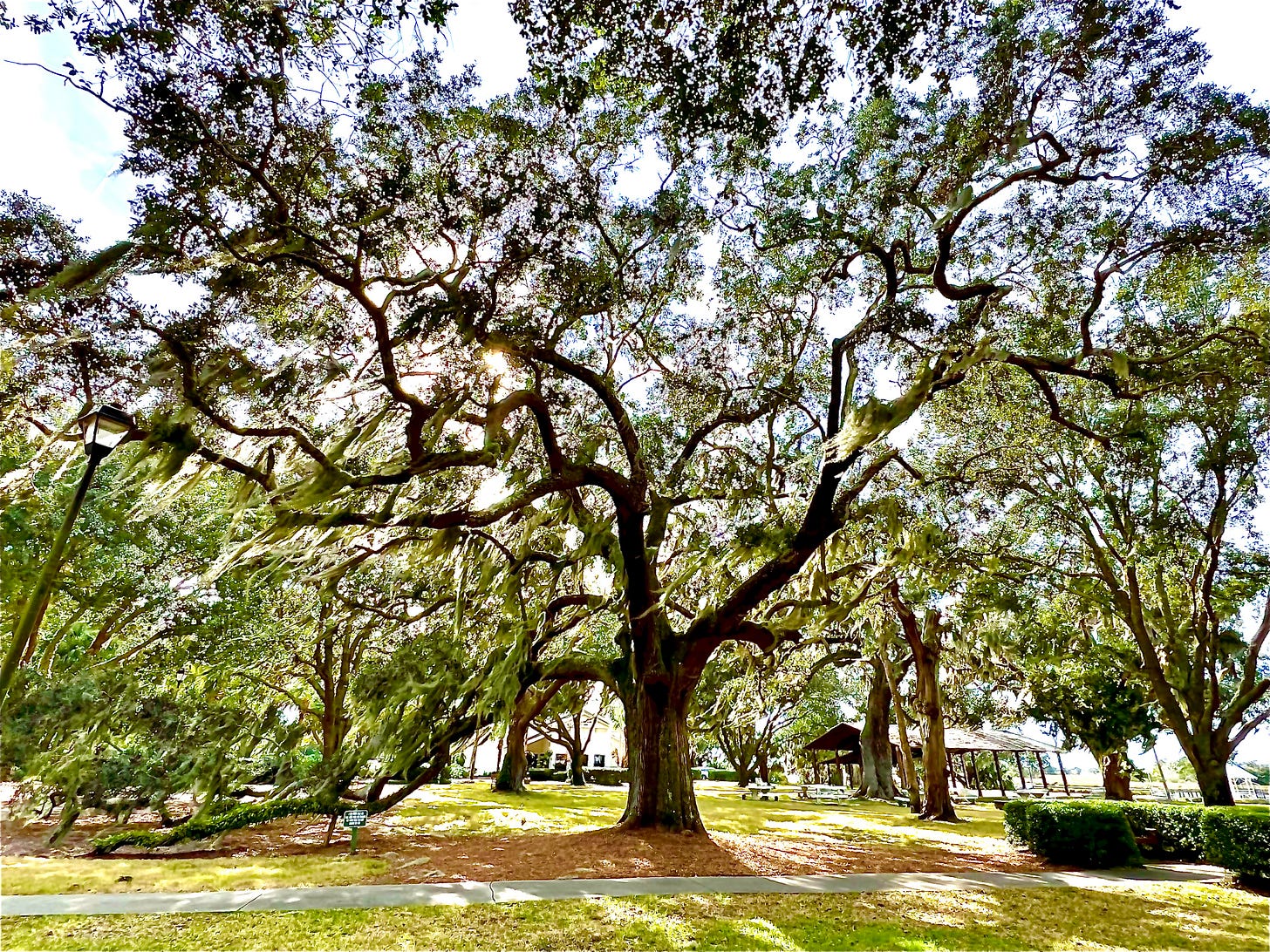A Map for Moving Forward
How we might rebuild from the ashes of American Evangelical Christianity
I recently returned from a beautiful weekend on Saint Simons Island, GA where I attended a conference centered around the topic of how the American Church might move forward from patriarchy and hierarchy. As I walked under the canopy of ancient oaks covered in Spanish moss and sat in a tiny prayer chapel with oyster shell walls and gazed at vibrant sunsets made of swirls of purples, oranges, yellows, and reds, I reckoned with how weary my soul has become.
I began deconstructing my faith in 2012 for two important reasons.
The first is that I was slowly realizing I had woefully insufficient answers to vital questions surrounding female subordination, biblical interpretation, violence (both Divine and human), and the use (and abuse) of power. The second reason is that my faith had grown anemic to the point of death. The schizophrenic messaging of America’s Evangelical brand of Christianity had taken a toll. On the one hand, I was taught that the crux of Christianity is living by faith through grace. On the other hand, monitoring, censoring, and forcefully changing my heart, mind, and bodily actions were of supreme importance. On the one hand, all people are loved and made in the image of God. On the other hand, they are also objects of God’s wrath and subject to being cancelled, boycotted, and publicly shamed depending on whether they crossed political or moral lines that the American Evangelical Majority deemed a bridge too far. And though I couldn’t have articulated this then because I didn’t yet have a robust spiritual vocabulary or theological knowledge base, I was suffering from the unnatural dualism prevalent in the American Church, resulting in a deep divide between my experience of spirit and matter.
As I began pulling golden threads, one at a time, some of my questions were answered but many more questions emerged.
As I adopted a learner’s mindset and began listening to new voices – in academia, science, literature, poetry, history, philosophy, biblical studies, and theology – I found my anemic faith rebounding and then thriving in ways I’d never experienced before. I was hearing the voice of my Good Shepherd (John 10) in the most unexpected people. I was gulping down Living Water (John 4, and 7) from previously off-limit wells. I was sliding down the oft-warned-about slippery slope and into the arms of the uncontrollable, unpredictable Spirit of God (John 3).
I was being born again. Again.
The thing is my personal deconstruction never once made me want to leave the Church. In fact, it had the opposite effect. Everything I unlearned, re-learned, and un-learned again, made me want to bring it into the Church for our collective consideration and well-being.
In the subsequent years, however, I received a painful reality check.
In my naivety, I believed that if people could only listen to the stories of spiritual, sexual, physical, financial, and emotional abuse that result from patriarchy and toxic hierarchy, they would see the rotten fruits of these man-made systems. I believed that if we could only get people to sit eye-to-eye with open ears and hearts they would return to themselves and to one another, rather than hanging onto their militant against-ness. I believed that folks in the Church would want to know the truth about our beloved Bibles, and that the truth would only make the Bible more exciting, more relevant, and more sacred than we’d ever realized before. I believed that the real history of so-called Christianity, and its orthodoxy, would be welcomed and energetically discussed if only people felt they had permission to do so. And, perhaps most naively, I believed that we could create a context where all of this could take place – inside the walls of the Church – that would be a welcome and refreshing change for most of us.
And this is one of the impetuses for this season of disappointment and disenchantment that I’ve been exploring here on the Golden Thread. Because, as it turns out, most people who are still in the institutional American Evangelical brand of Church are simply not interested in any of what I described above, even if they claim to be. It seems what the more conservative people really want is for whining, woke, do-gooders to stop pulling all these damn threads and let well enough alone. And, frankly, the folks on the progressive side are often just as stubborn. They don’t want to hear the viewpoints of those they’ve conveniently labeled racist, bigoted, and ignorant.
As a pastor and spiritual care practitioner, I have been blown away by the relentless anger, unchecked cognitive bias, childish refusal to consider alternative viewpoints or additional facts, and smug self-assuredness from the Church in the past decade. And when I say “the Church” I am most certainly including myself in all this mess.
We continue to divide Christ in the name of Christ.
Friends, this should cause us to tear our garments and take out the sackcloth and ashes. We have mourning to do.
And that is precisely what I did during my time at Saint Simons Island last week. I mourned, I cried, I repented, I forgave, and I reveled in grace again (more on that later).
It’s devastating but true that we are an organization in failure by every measurement. We aren’t just hemorrhaging “numbers,” but also public and personal trust, the human qualities of empathy and compassion, and our ability to learn, grow, and change. Most grievously, however, we may be missing the presence and activity of God in the world by refusing to listen to one another and adapt to the changes of our time, like the Early Church showed us how to do in Acts 15.
Harvard Business Review published a compelling piece in their latest issue about the power of storytelling in bringing about bold change (here). Since, depending on the measurement, up to 70% of organizational change efforts fail, what does the Church need most to rebuild from the ashes in America? I was unsurprised to see that storytelling was HBR’s answer to this kind of question. Our God has self-revealed through storytelling and imbedded this ability and need in each human heart. In fact, I believe in the power of storytelling so much that my entire doctoral project was centered on it.
I will be exploring storytelling, spiritual healing, and leadership for the next few months here in this space, with the driving question of how we might move forward to make the changes our time in history and our circumstances demand of us. Rather than pontificating to you what I think are the best methods and modalities for change, I will invite you into some of my experiences through storytelling. I would love to hear from you, my readers, as well. Do you have a story you’d like me to hear? Does something stir deep within you as you consider these topics? Whatever arises, please feel free to message me or, even better, leave a comment so others can benefit from your golden goodness too.
Until next time, I leave you with this prayer by the late, great George Macleod. I hope it evokes thought and kindles renewed hope for you as it did for me.
Lord Jesus, You are beneath us.
We believe it.
When we slip, You catch us.
When we kick You in the face, You just serve us.
And when we pack in and fall right down,
You come further down just to be beside us.
In awe we thank you.”







Looking forward to following this series, Amber. Thanks.
The difficulties and stumbling blocks you talk about can be ameliorate with grace and mercy. Christian tools for both the accused and the accuser.